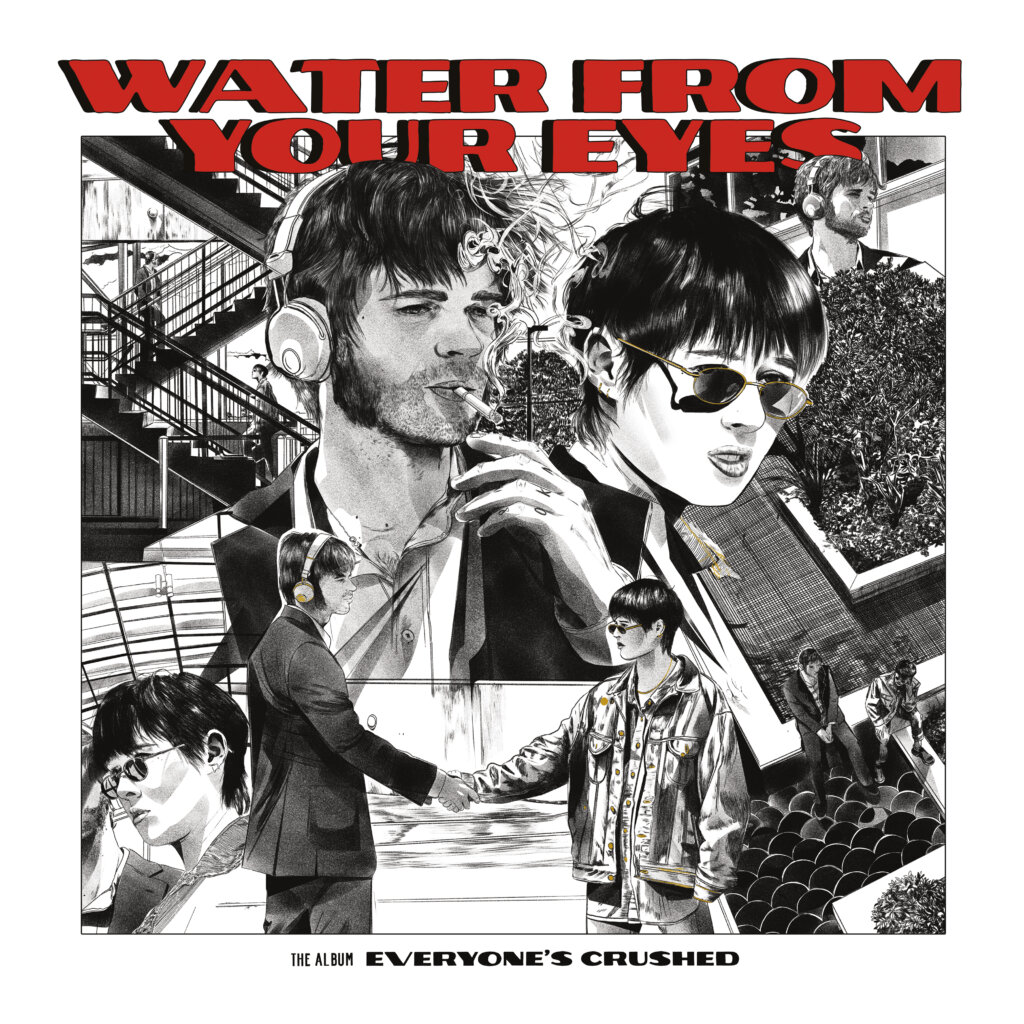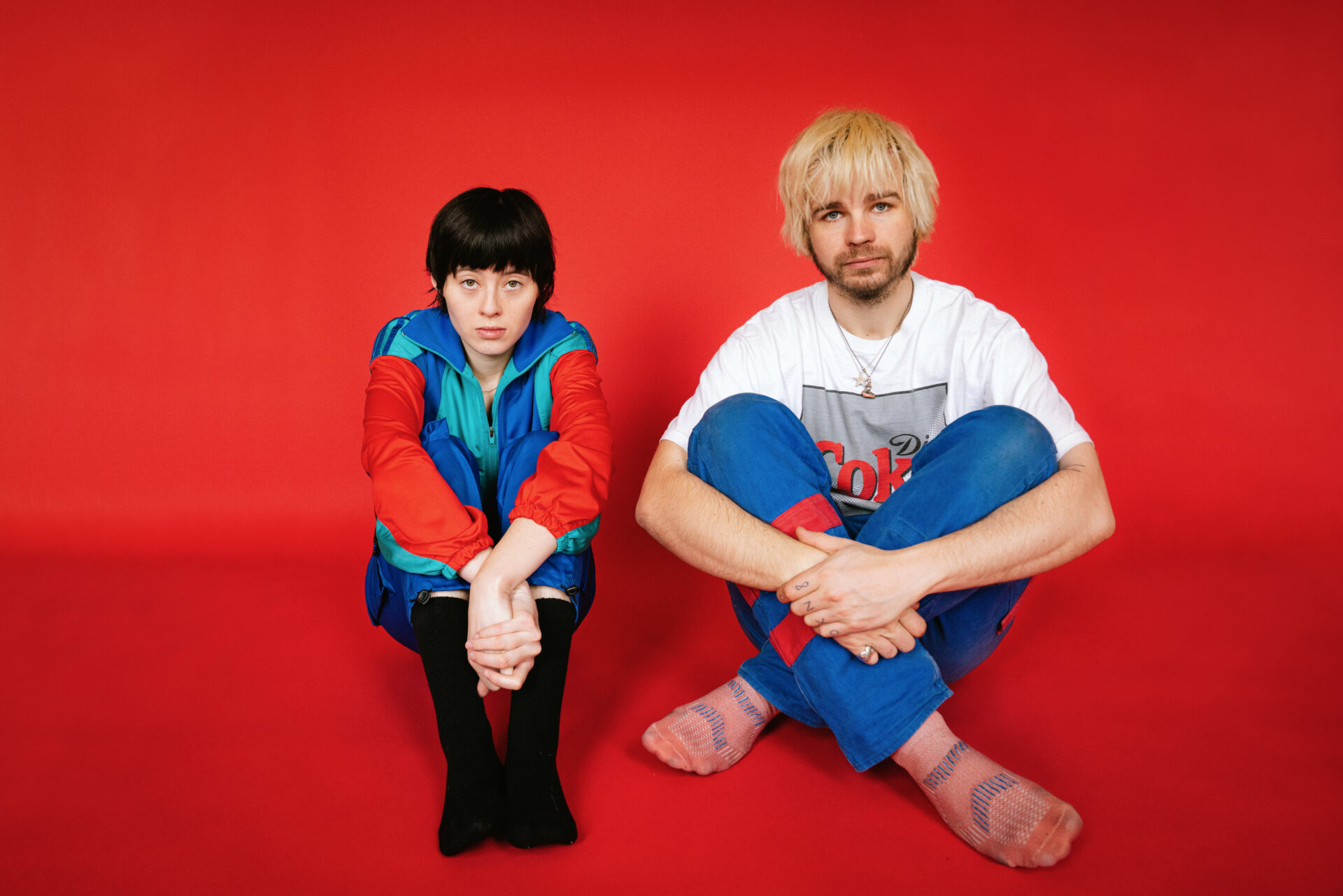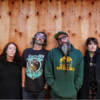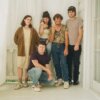Brooklyn NY duo Water From Your Eyes are relatively less known this side of the Atlantic, but that is set to change with the release of their sixth album next month, Everyone’s Crushed, their first for Matador Records. It’s hard to pinpoint exactly why their weird, eclectic sound works. Often a mix of industrial-grade beats and samples, classic 60s pop, 70s underground rock and oblique beat poetry, each of their albums has been different from the last but each retains a cool mystery and core attitude that is truly hard not to love. We’ve followed them from the early days and it’s heartening to see that hard work (they always seem to be on tour) and sticking to their innate, if skewed, sense of direction has paid off.
We should add that they’re super nice people to boot. We enjoyed a natter over Zoom and a coffee recently, in a quiet moment ahead of an epic US tour with Snail Mail. The pair had just celebrated their signing to Matador with a three-date residency in New York, playing free shows as a thank-you to fans, friends and industry supporters.
As we opened the call, we learned that Water From Your Eyes also love bowling. The final night of their residency was an evening just for knocking some pins down at Melody Lanes with anyone who wanted to join in. It transpired that things did not end well, however, as ‘the guys from Pitchfork and Rough Trade’ are apparently very competitive league bowlers who kicked everyone’s ass and, as guitarist Nate put it, “practise bowling in a way we do not…”
Read below for the story behind Water From Your Eyes’ forthcoming releases, their live performance routine, self-care and life on tour, and trying not to look like a cartoon character in small-town America…
OK, so tell our readers who you are and how you describe your music?
Rachel: I’m Rachel Brown. I sing in this band Water From Your Eyes, and, yeah, I think people should just know that there’s a lot of sounds going on and that we just hope that they like them and that they’re having a good time. And if they’re not, I guess we just hope that they don’t leave comments, because we can see them.
Nate: Hi, my name is Nate Amos. I do the bleeps and bloops and music and Water From Your Eyes. I think the hater comments are funny.
So, the kind of people who would love your music, what else might they like?
Rachel: Um. They probably like long walks at night.
Nate: That’s a hard question. True. I also guess it depends on the particular song. I feel like there’s not something for everybody, but there’s definitely something for different kinds of people.
Rachel: They might like that first Cornelius album.
You’ve been around some time and both have other ongoing projects: Rachel has Thanks For Coming. Nate, you’ve worked with and produced other artists, like Lily Konigsberg (on My Idea) and you’ve also released music as This is Lorelei. How do you feel Water From Your Eyes differs most from those?
Rachel: I think, with Thanks For Coming besides the fact that I’m singing and I write the lyrics, there’s like, no discernible thing in common. It’s not even the same singing. The way Nate writes the melodies is very different to the way I write. It’s just so different. It’s not slacker indie rock! (laughs). Everything else about Water From Your Eyes also feels different, because it’s so unchecked. For (Thanks For Coming) there’s nobody to say, “maybe… we should do this differently”. Whereas Water From Your Eyes is like a really streamlined process, at least for me, because I get there, and the music’s already made! Generally, there’s like an instinctive feel to these songs. They all sound different, but I feel like there’s a definite attitude that they all have. It’s not necessarily my general attitude. It’s my ‘Water From Your Eyes attitude’.
GIITTV: Does this attitude/persona go with you onto the stage? You wear dark sunglasses, you always look kind of cool and focused…
Rachel: Yeah, I feel like I have to, really. It was really weird when we started not to play an instrument. I look at my hands when I’m playing the guitar, even if I know the chords, so that I don’t look at the audience. There’s also a lot of chatting with my solo stuff. I chat a lot (laughs). But with Water From Your Eyes, there’s like the backing tracks going and even when the backing tracks are playing, I try to talk in between songs except that like it’s pretty loud noise. I don’t actually think people hear me.
So that part is not intentional, like performance art?
Rachel: Ha! It’s funny because people say things like “oh, you’re really, like, mysterious. I never know what you’re going to be doing on stage”. In reality, I’m just trying not to trip up or walk into anything!
Do the backing tracks and songs change much on tour? Or are they pretty much fixed?
Nate: Usually by the time we go out on tour, they’re pretty much fixed. When we’re getting ready to go on tour I practise a lot, timing out like the length of the different transitions and figuring it out. It’s a funny thing because you know live, it’s very guitar driven, but a lot of the recorded songs don’t really have that much guitar in them. So I have to strategize for what role the guitar is gonna play in different songs live.
Is there much experimenting with that on stage?
Nate: Within the context of there being pre-recorded tracks, the idea is to keep the live set as flexible as possible so that everything can kind of evolve. When we’re getting ready to play a certain song for the first time on tour, there’s a lot trial and error leading up to it. But once it’s basically figured out, the tracks are pretty much set. But there’s also improvisation and experimentation live too, as the parts that I play generally change a lot over the course of a tour. I think that’s important because it keeps things fluid. Because it’s backing-track driven, there’s always a concern it’s too static or boring, or just the same as the album. So having the guitar parts constantly change allows for a certain amount of fluidity to the songs.
You also sometimes have a guest guitarist on tour, for example when you were on tour in Europe last year you had Seth Engel from the band Options with you. Does that make it more complex to prepare?
Nate: Definitely. And it keeps it fun too. I have two different versions of every song that we play live. If it’s just me and Rachel what I’m playing is going to be drastically different than if there are two guitars because then I tend to like split the parts, so I don’t fall asleep (laughs). That flexibility just like keeps the songs from getting too static and keeps it interesting.
So is Rachel going to get to play guitar at some point?
Rachel: I got a guitar! I’m going to play it, but only for my own stuff.
Some of your earlier tracks were very much acoustic guitar-based, like the Feels A Lot Like EP.
Rachel: Yeah, actually, we made that differently. I sent Nate some little guitar parts. And then he made it into like songs. Yeah, I forgot about that.
Nate: It’s like a prompt system. Rachel would send me like a chord pattern or a little melody or something, and then I’d try and use that as like a jumping off point.
Do you use the same prompt approach for lyric writing?
Rachel: Yeah, the lyrics for the first album and the second one are written from the point of view of sad animals.
Yeah (laughs). And the third one is about the animals in the movie Homeward Bound. And then the 4th one is about a very specific dog named Jazz Kennedy, who’s a dog in a dog world, and his father just passed away. And he’s just like wandering around this lake thinking about life. That one, I think was the highest we were.
But the thing is that writers like us listen to it and we read all sorts of things into those lyrics. And then we write about them. And you’re thinking “Yeah, that wasn’t what the song was about…”
Nate: That was the fun thing about it. It would just be about finding a character to write from the viewpoint of, and then keeping it vague enough so that you couldn’t figure out what it was really about.
Rachel: ‘Cold Stare’ is the most obvious one, because like once you realise that it’s just from the viewpoint of a raccoon. The lyrics make so much more sense (laughs). It sounds like things that raccoons would be thinking about. We haven’t really done that with the new album though.
Your next single ‘True Life’ is out. What do we need to know about it?
Nate: I’m really excited for this to come out. The song cracks me up. I don’t really like know how this one came about, but something that makes it really special is that Rachel wrote almost all of the vocals for the song which makes it unique in the Water From Your Eyes catalogue. Musically it’s a weird like an underground, nu metal death, stomp song and so I said “OK, Rachel, this has to be our ‘Short Skirt, Long Jacket’”.
Rachel: Yeah, the words for this one came really easy. I don’t know what it was. Hearing the parts for ‘True Life’ I thought “wow, this song is so much fun!”. And yeah, I guess maybe I’d just been listening to a lot of Red Hot Chilli Peppers or Cake because it was like, yeah “let me get one of those”…
Nate: Interesting fact. The lyrics for the middle of this track were originally lifted from a Neil Young song ‘Cinnamon Girl’, which we then had to change because Neil Young’s lawyers were like “no”. So now they’re about how Neil Young wouldn’t let us use his words. ‘True Life’ deals with life and assorted complications of the material world.
The new album Everyone’s Crushed has a really dark humour to it. Where do its lyrical influences comes from?
Rachel: We live in just, like, really dark times. It’s not really a commentary, it’s more just the vibe of what’s happening… We also had more time to work on it. It wasn’t all done at once and it was done over like a pretty long period of time, so we had time to think. And maybe we’re just feeling sillier!
Nate: The last album Structure is a lot more obtuse and hard to pin down. A lot of Structure was more impressionistic. A theme would emerge and then it would kind of become about something over the course of writing it. But it wasn’t like the earlier albums where we knew the place we were going to write from.
Rachel: I guess lyrically Everyone’s Crushed is just us thinking about how fucked up things were. Nate was also just like really going through a tough time.
Nate: The album was made in a complicated time for people generally, but I was also having some health issues and was in the process of dealing with a bunch of substance issues. I got sober part of the way through making the album. Some of the songs on Everyone’s Crushed feel very tied to feelings of helplessness in the face of substance abuse. But also the humility and need to move forward. It’s an appreciation of people’s patience or something like that. For me, the songs are like realising how complicated things were, and then, still in the face of all this shit that went wrong, the love that’s still there for yourself and for the people you’re close to. It’s like a weird like complicated little ball of different emotions.
You worked on it over a longer time frame, so how easy was it to put this album together compared to previous releases?
Nate: Well the interface that I was using was also only half-working. The production attitude for Water From Your Eyes releases has been getting consistently worse and worse since I moved to New York a few years ago. Our first three EP’s were recorded in the studio that I was working at and those sounded really good. But once I moved to New York, I stopped having a space like that and so just went with a recording setup that would be largely accessible. I didn’t really want to use equipment that wasn’t relatively easily attainable to an average person. So, Everyone’s Crushed is made on a broken $100 interface and a dying computer with a broken screen. Basically the lowest bar of like equipment quality of any Water From Your Eyes album so far. I was worried that the computer was just gonna die, like the whole time.
That sounds fun. What effect did it have on your ways of working?
Nate: It was kind of cool actually, because I could only do very small amounts of mixing and I would have to bounce out the files and start a new session. It’s more like low budget analogue recording where you have to be constantly dumping things and combining them onto a smaller amount of tracks. It was a very destructive recording process. It makes you commit to particular sounds in the moment. I think a lot of the most interesting music is made this way, and this applies to art in general. The most interesting content is rarely made by the people who have access to all the fancy stuff. Especially in music now, with music technology being the way it is, the most exciting music comes from people with the most modest setups. I’ve worked in a recording studio and chased the whole hi-fi thing, I definitely understand why people like to work in nice studios and get the nicest sounds etc. But you can get lost in that kind of gear and trying to get the best sound possible. I would much rather hear an interesting album that was recorded in a bedroom than a not interesting album that technically sounds awesome.
So your next one is going to be recorded on an iPhone with instruments made with elastic bands?
Nate: (laughs) Yeah it’s gonna get worse and worse.

Rachel, you’ve also talked a lot about mental health and self-care for DIY musicians in Jenn Pelly’s really great article for Pitchfork. Is it different now you’ve signed to Matador or is it a different kind of pressure?
Rachel: Yeah. It’s really different. It’s similar in the sense the other labels we’ve worked with are great, where everybody’s just like been really nice and supportive. It’s also weird to have something that is financially sustainable, a career. It’s opened up other opportunities that we never, I never would have thought. I’m still mentally ill, so that hasn’t changed (laughs). And we still go on tour, a lot.
It was weird timing doing the Pitchfork interview last year. I’d been extremely mentally ill on the first proper tour around the country. There are all these things that I didn’t know. There was so much more that goes into touring. Not having money is a pressure too. When we first went on tour it was on my money. It’s really stressful not to have enough and to not know whether you’re going to be able to buy food, or afford a hotel, or pay the rent when you get home. A lot of our first tour was really low paid. Gas prices also went crazy right before we left and so having to do 10 different jobs every single day and not having a minute of rest meant I forgot about keeping my mental health in check. I just let it spiral. By the time we went on the second tour in Europe I had learned so much from that experience. Like beyond everything, it’s extra vital for us to look after our mental health. Being able to recognise the things that each of us needs to have in place. It’s definitely been good talking to people who’ve been doing tours for a really long time and hearing their routines.
You’ve toured with Interpol recently. Did they have any tips?
Rachel: Yeah. I love Sam (Fogarino). One of the nights pretty early on I remember I was feeling kind of crazy, and I said to him “Man like, how do you do this?!” He said it was about the small but really important stuff. And one of these things was zoning out, playing a game on his phone before they go on stage. I thought “I love playing games on my phone, I’m gonna do this too”. It’s interesting to hear what everybody’s routine is to keep sane. Coming off tour is hard too though. It’s weirder. I don’t have that high of being on tour and the adrenaline that you have every single night. I’m at home and thinking to myself “what am I doing? Maybe I should go to the grocery store or cook or something” but like, I don’t.
It’s good not to have to do something – it’s good for your brain to be bored. Being bored is really important.
Rachel: Being bored is super important. A couple months into the pandemic I had literally never felt better in my life. I was just reading books, lay on my floor listening to a lot of classical music. I was watching movies, I was cooking so much and I was so bored and I was like “wow, I’m so bored. There’s nothing to do. This is, like the best I’ve ever felt”.
You do seem to play a lot of shows, and you’re out on tour across US again soon. Do you get much time to sightsee?
Nate: There’s a lot of driving, so in that way, from the car at least, we will see so, so much.
Rachel: Right. Have you driven across the US?
Nate: It’s big.
Rachel: Like, you can stop for gas, but the drives are so so long. You have to wake up really early to leave one place to at the next for a certain time. You can’t stop anywhere for too long. You just see interstates. Sometimes we’ll go to a diner or somewhere and that’ll be nice. But, oh man we stick out! I remember we went somewhere and they were just like “ohh… I haven’t seen you before”. You look rough on the road too. I get out of the car looking like I got like I’ve been up for 10 days.
Nate: Also, the longer you’re on tour, the weirder you begin dressing.
Rachel: Yeah, that’s so true.
Nate: By the time you get to your 20th small town you’re wearing weird outfits and gradually losing touch with reality. You begin looking more and more like some weird cartoon character. By the time you’re on the home stretch and stopping somewhere in like Montana, trying to get lunch, everyone’s just looking at you.
Ha! I guess when you get back to New York, you’re fine. You know, they don’t care there?
Rachel: They’re too busy to notice what you’re doing. If you look crazy in New York, like. Nobody’s gonna blink an eye. It’s New York.
People are generally very nice, but for me there’s always this uneasy feeling of being in places like that. I’m biracial and non-binary and there’s like this feeling that sometimes people just like really look weirdly at you. We went to some small place in Tennessee and a woman gave us the dirtiest looks. We’d just walked in so it was so weird. I would say 95 or more percent of people are usually really nice. But then sometimes you’re at a gas station or diner, and you get ‘that feeling’. There’s always the potential feeling of uneasiness because people really can be racist and homophobic. For the most part people don’t care. Like people are like people are people. But it can be weird stopping in the middle of nowhere here. There’s even one part of California where you like, don’t stop your car because you might get shot by the weed farmers, or the psychos who kill people who come onto their property or threaten them with guns.
It’s like another world there. We don’t have that at all here, it’s hard to imagine.
Rachel: Yeah, no. I mean, there’s obviously not as much gun violence as (I think) people think. I wremember telling people I was from Chicago in Europe was funny, because people would say “Have you been shot at?” “Like, no haha”. Yeah, definitely sometimes, there’s a feeling you might get shot. It’s really weird here. I don’t like it. I want to leave (laughs).
Well, you’re back in UK and Europe in May with Interpol.
Rachel: Yeah, it should be fun. It’s really funny opening for Interpol. I love them, but sometimes I tell them “I don’t think you understand that some of your fans just do not want to see us!”
But what a great way to discover new bands.
Rachel: Yeah, some people are definitely really into it.
So when it’s your headlining tour, who are you going to take with you?
Rachel: I never want to headline! I hate playing last. But I’d love to take Babybaby_Explores, or Sweet Baby Jesus.
Nate: Namely, anyone with the word baby in their name, yes.
Nate, what about you?
Nate: Sweet Baby Jesus is a band that I’ve always thought would be fun to take on tour. There’s also this band called the Red Hot Chilli Peppers. I think it’d be good to give them a little more exposure, you know, if given the opportunity!
Main photo: Eleanor Petry
LIVE UK
May
28th – Brighton – Dome*
29th – Leeds – O2 Academy*
31st – Edinburgh – The Queen’s Hall*
June
1st – Bristol – O2 Academy*
August
19th – Brecon Beacons – Green Man Festival
*with Interpol




